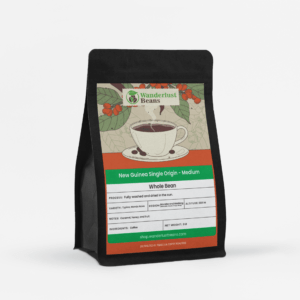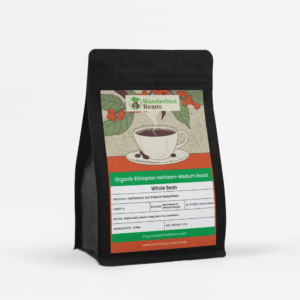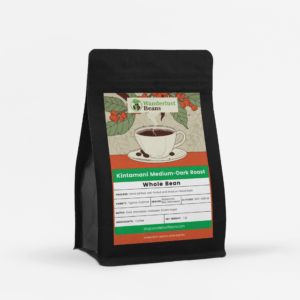In recent years, the coffee industry has seen an increased focus on ethical sourcing, with Fair Trade Coffee Beans being at the forefront of this shift. These beans, sourced under stringent Fairtrade regulations, promise a conscientious consumption choice by ensuring fair remuneration for farmers and advocating for sustainable farming practices.
However, one must ponder whether this certification truly impacts the growers positively and if consumers are playing a substantial role in promoting Fairtrade. Moreover, it is worth considering the tangible benefits of choosing Fairtrade coffee and its environmental implications.
Key Takeaways
- Fair Trade Certification ensures sustainable and ethical sourcing of coffee beans, promoting fair compensation and economic balance for farmers.
- Top Fair Trade producers like Sure House Coffee Roasting Co. and Trader Joe’s adhere to strict ethical standards and work closely with Fair Trade cooperatives.
- Consumers can promote ethical sourcing, economic justice, and sustainability by choosing Fairtrade Certified coffee; it benefits consumers, farmers, and the environment.
- Fairtrade labels symbolize rigorous standards and prioritize the wellbeing of farmers; varieties such as Guatemala Quetzal and Ethiopia Yirgacheffe guarantee high-quality beans.
Understanding Fair Trade Certification
To fully comprehend the concept of Fair Trade Certification, it is essential to understand that it serves as a guarantee that the coffee beans have been sourced ethically and sustainably. This certification ensures that Coffee Farmers are compensated fairly for their labor, thus promoting an economic balance and alleviating poverty where it is most needed.
Fair Trade Certification provides a safeguard for farmers against volatile market fluctuations, offering them a stable income and decent working conditions. This model of trade encourages coffee cooperatives to adopt sustainable farming methods, which are not only beneficial for the environment but also produce high-quality Fairtrade coffee.
Moreover, the certification mandates transparency in the supply chain, ensuring that the rights of coffee farmers are not violated. It supports community development by investing in projects like healthcare, education, and infrastructure, thus contributing to the overall welfare of the farming communities.
Additionally, Fair Trade Certified coffee beans are produced without the use of harmful chemicals, maintaining the integrity of the product and the health of the consumers. The Fairtrade Mark is a symbol of this assurance, signifying that the product meets these high ethical and sustainable standards. It offers consumers a tangible way to contribute to the betterment of coffee farmers’ lives.
Identifying Fair Trade Brands
Identifying Fair Trade brands involves understanding the significance and authenticity of the Fair Trade labels.
Consumers should be aware of top Fair Trade producers such as Sure House Coffee Roasting Co., Thanksgiving Coffee, and Trader Joe’s, which are renowned for their adherence to Fair Trade practices.
This knowledge allows consumers to make informed choices, supporting brands that ensure economic justice, gender equality, and environmental protection.
Understanding Fair Trade Labels
Navigating the landscape of fair trade coffee brands requires a keen understanding of the Fairtrade Mark, a symbol of rigorous environmental, economic, and social standards that combat poverty, uphold workers’ rights, and champion environmental protection.
This mark, found on fair trade coffee packaging, commits to gender equality and the abolition of child labor, ensuring a more equitable, sustainable coffee industry. Fairtrade certification not only guarantees high-quality coffee beans, but also fosters resilient communities and advocates for a better deal for coffee farmers.
Brands like Sure House Coffee Roasting Co. and Trader Joe’s offer a variety of Fairtrade Certified options, including dark roasts and single origin, empowering the coffee growers and advancing the fair trade movement.
Top Fair Trade Producers
Building on the understanding of Fairtrade labels, it’s crucial to spotlight key producers in the industry who not only meet but exceed these ethical standards, setting the bar high for fair trade coffee production.
Fairtrade certified brands like Sure House Coffee Roasting Co., Thanksgiving Coffee, and Trader Joe’s are significant players, working closely with fair trade cooperatives to ensure ethical production. These brands foster direct trade relationships with countries like Guatemala, Nicaragua, and Ethiopia, known for their high-quality beans.
Impact on Coffee Growers
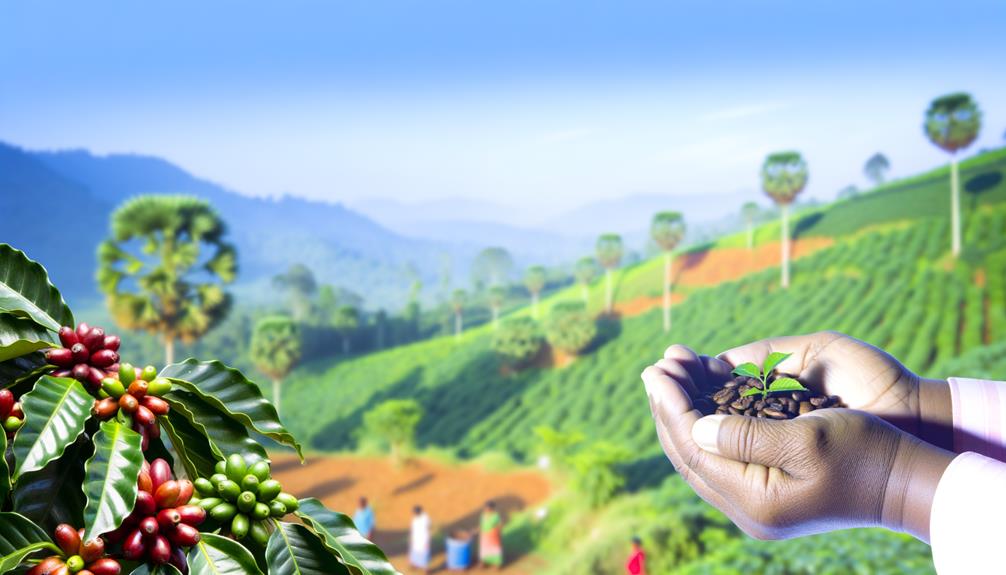
Undeniably, fair trade certification significantly enhances the livelihoods of coffee growers, providing not only stability and fair compensation through the Fairtrade Minimum Price but also facilitating investment in quality and sustainability. This model empowers farmers economically, encouraging growth in local economies and enabling investment in sustainable practices that boost climate resilience.
The social impact of fair trade on communities is profound. Fairtrade Premium funds are often invested in business and community projects, fostering social cohesion and community development. These funds can support everything from infrastructure improvements to education initiatives, driving a significant uplift in the quality of life for coffee growers and their families.
Through their collective bargaining power, small producer organizations can negotiate better terms for farmers, further promoting farmer empowerment. This approach not only enhances the economic stability of coffee growers but also directly contributes to the production of better-quality beans, as growers have the means to invest in improved farming practices.
Consumer Role in Fair Trade
Playing an instrumental role in the fair trade movement, consumers wield significant power in promoting ethical sourcing practices and social responsibility in the coffee industry by choosing to purchase Fairtrade Certified coffee beans. This act of conscious consumerism signifies more than just a transaction; it’s a testament of consumer empowerment with a global impact.
In purchasing Fairtrade Certified coffee beans, consumers actively contribute to economic justice. They ensure that coffee farmers receive fair wages, subsequently combating poverty and promoting gender equality. This sense of social responsibility is a powerful tool in empowering disadvantaged coffee growers and building a more equitable global economy.
Additionally, the consumer’s role extends to sustainability and community development. By opting for Fairtrade Certified coffee beans, consumers support environmentally friendly farming practices, contributing to the sustainability of the coffee industry. Furthermore, the premium paid on Fairtrade products is often invested in local community development projects, enhancing the livelihoods of coffee farmers and their families.
Benefits of Choosing Fairtrade Coffee
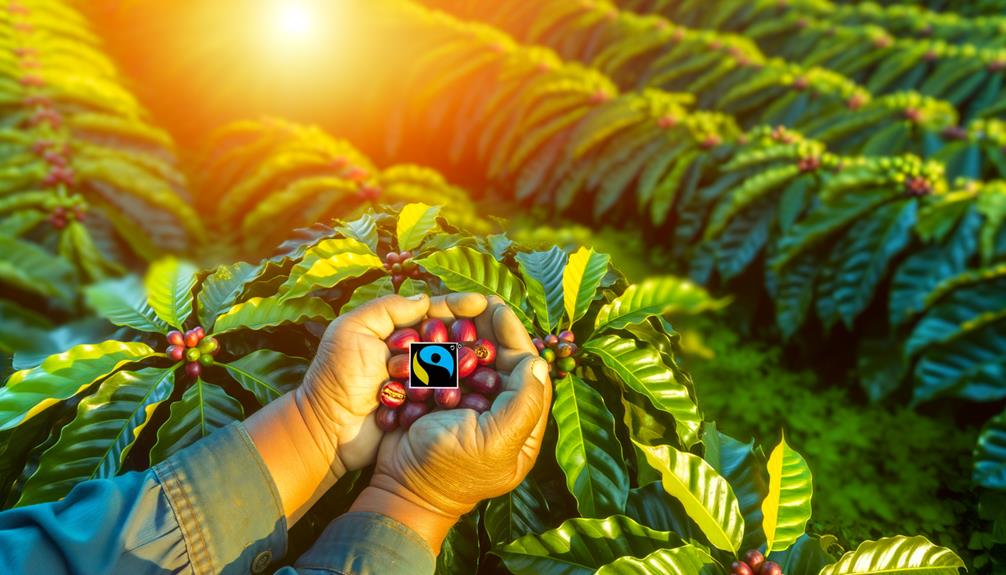
Choosing Fairtrade coffee offers significant advantages to the consumer, coffee farmers, and the environment. The ethical sourcing of Fairtrade coffee directly contributes to the economic stability of farmers in developing nations, ensuring they receive a fair price for their product.
Moreover, the environmentally friendly practices required for certification serve to protect our planet, making Fairtrade coffee a responsible choice for the conscientious consumer.
Ethical Sourcing Impacts
When consumers opt for Fairtrade coffee, they directly contribute to the enhancement of farmers’ livelihoods by guaranteeing them fair trade wages and improved working conditions. This choice promotes sustainability benefits, including environmentally friendly farming practices, and supports gender equality initiatives within the coffee industry.
By choosing Fairtrade, consumers cultivate a sense of belonging and community, knowing their choices impact:
- The livelihoods of farmers, granting them dignified living conditions.
- The environment, advocating for sustainable farming methods.
- The fight against gender disparities by endorsing equal opportunities.
- The overall quality and authenticity of the coffee they consume.
In essence, the ethical sourcing impacts of Fairtrade coffee extend beyond simple coffee bean transactions, fostering a global network of conscious consumers and producers.
Farmer Economic Stability
In understanding the broader ethical impacts, it’s crucial to also recognize the significant economic stability Fairtrade coffee brings to farmers. This stability is achieved through Fairtrade Minimum Price that shields farmer livelihoods from market volatility, promoting market stability. An extra incentive is given to farmers for adapting sustainable practices, further supporting their economic empowerment.
| Benefits | Impact |
|---|---|
| Fairtrade Minimum Price | Protects farmers from market fluctuations |
| Sustainable Practices Incentive | Encourages environmentally friendly farming |
| Fairtrade Premiums | Contribute to community development |
| Small Producer Organizations | Facilitate buyer empowerment |
Environmentally Friendly Practices
By opting for Fairtrade coffee, consumers not only enjoy a high-quality beverage but also contribute to environmentally friendly practices, such as sustainable cultivation techniques and organic farming methods, integral to the production of these beans.
- Organic Farming: Fairtrade coffee is grown without harmful chemicals, preserving the soil’s health and your well-being.
- Sustainable Cultivation: This method ensures efficient use of resources, minimizing negative environmental impacts such as soil erosion and water pollution.
- Biodiversity Promotion: Fairtrade practices protect ecosystems, fostering a rich variety of species within coffee farms.
- Climate Resilience: Fairtrade coffee aims to reduce carbon emissions and promote resilience against climate change in coffee-producing communities.
Environmental Impact of Fairtrade
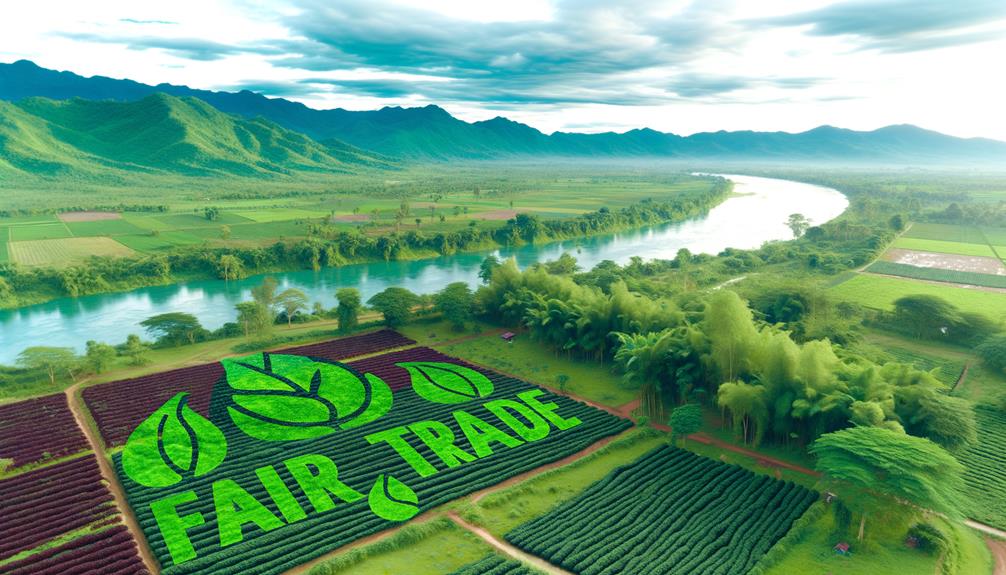
The environmental impact of Fairtrade is significantly positive, as the certification promotes sustainable practices in coffee production, notably reducing the use of harmful chemicals while preserving biodiversity. This approach is underpinned by three key areas: reducing emissions, sustainable farming, and conservation efforts.
Fairtrade supports methods that prioritize conservation of natural resources, such as water and soil, to minimize environmental impact. This is done through encouraging farmers to implement eco-friendly techniques like shade-grown cultivation, which not only protects ecosystems and wildlife habitats but also contributes to the fight against deforestation and climate change.
| Eco-friendly Techniques | Impact |
|---|---|
| Reduction in harmful chemicals | Preserves biodiversity |
| Conservation of natural resources | Minimizes environmental impact |
| Shade-grown cultivation | Protects ecosystems |
| Responsible land management | Fights deforestation |
Updates in Fairtrade Standards
Recent updates in Fairtrade standards, particularly the Fairtrade Coffee Standard, have introduced a focused approach towards preventing deforestation in coffee-producing regions. This approach underscores how Fairtrade pricing models and standards are being re-engineered to better address environmental concerns, besides ensuring a living wage for farmers.
Now let’s focus on four key updates:
- The revised Fairtrade Coffee Standard has embedded stringent deforestation prevention measures, encouraging sustainable farming practices.
- Fairtrade pricing models are now designed to ensure the Living Income Reference Price for farmers. This ensures that income from coffee farming is sustainable and contributes to the socio-economic development of farming communities.
- A new partnership has been forged to enhance deforestation monitoring among Fairtrade coffee producers, heightening sustainability efforts and providing resources for farmers.
- Fairtrade standards continue to prioritize the wellbeing of farmers, workers, and businesses, reflected in the robust certification processes.
These updates demonstrate Fairtrade’s unwavering commitment to both the coffee farmers and the environment. They remind us that Fairtrade is more than a label – it’s a global community striving for a sustainable and equitable future. As we sip our Fairtrade brew, we are part of this change.
Exploring Fairtrade Coffee Varieties
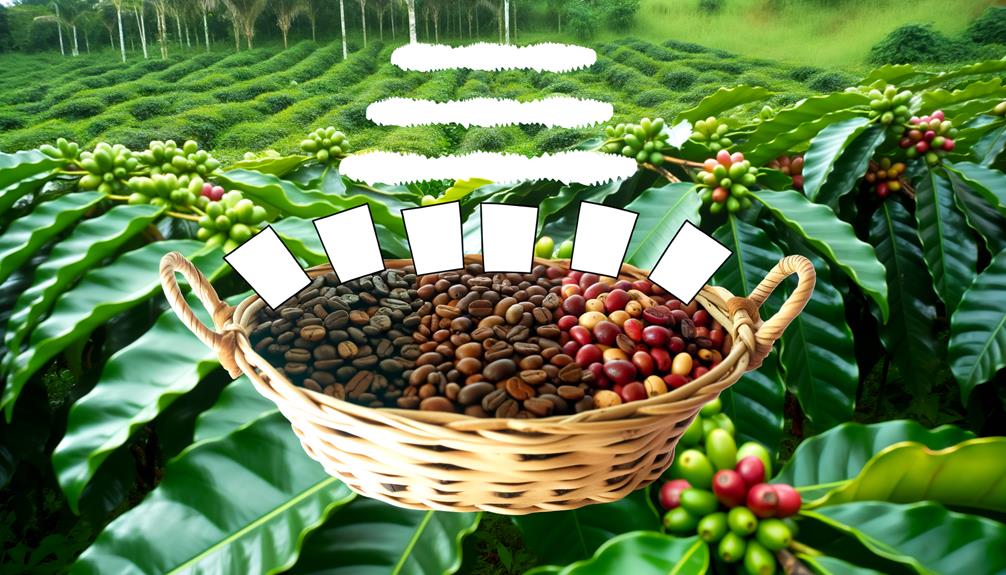
As we delve into the diverse range of Fairtrade coffee varieties, it becomes evident that each offers a unique taste profile, coupled with a commitment to sustainable farming practices and equitable trade. Guatemala Quetzal, for example, boasts distinct cocoa and caramel flavor profiles, priced at a reasonable $15.99. Brewing techniques can accentuate these rich notes, providing a satisfying coffee experience.
Our exploration continues with Nicaragua Miraflor, which presents a harmonious blend of honey, almond, and chocolate notes for $16.99. The unique taste profile emerges through careful roasting methods that amplify the bean’s inherent qualities. Similarly, Honduras Congolón, priced at $14.99, captivates with its apple, honey, and caramel notes. The flavors are enhanced by the coffee’s roasting process, which is a critical factor in determining its final taste.
Ethiopia Yirgacheffe, priced at $17.99, offers a vibrant floral, lemon, and tea profile, while Sumatra Telong, at $16.99, is celebrated for its earthy and spicy notes. These distinct flavor profiles offer a sense of belonging and connection to their country of origin, emphasizing the uniqueness and diversity inherent in Fairtrade coffee varieties.
Frequently Asked Questions
What Is Fairtrade Coffee Beans?
Fairtrade coffee beans pertain to Trade Impacts, Bean Quality, and Farmer Benefits. These beans are ethically sourced, ensuring high quality, while positively impacting trade and providing enhanced benefits to farmers globally.
How Can You Tell if Coffee Is Fairtrade?
To verify if coffee adheres to ethical standards, look for the Fairtrade Mark on the packaging. This certification verification assures compliance with Fairtrade standards, signaling respect for workers’ rights and sustainable agriculture practices. Understand the label, make informed choices.
Is Fairtrade Coffee Ethical?
Fairtrade coffee addresses ethical dilemmas, such as fair wages and working conditions. It encourages consumer responsibility and sustainable farming, fostering environmental care and community resilience. Thus, Fairtrade coffee is indeed ethical.
What Is the Difference Between Fairtrade Coffee and Normal Coffee?
Fairtrade and normal coffee diverge in price comparison, consumer perception, and environmental impact. Fairtrade ensures equitable pay and sustainable practices, while normal coffee may not, thus affecting consumer perception and its overall environmental footprint.
Conclusion
In conclusion, Fair Trade Coffee Beans uphold stringent social, economic, and environmental standards, warranting their appeal to conscious consumers.
The benefits extend beyond high-quality coffee, as it fosters fair wages, gender equality, and sustainable farming.
By choosing Fair Trade, consumers play a pivotal role in promoting these standards, affirming the vitality of ethical sourcing.
Further exploration into Fairtrade coffee varieties can deepen understanding and advance the positive impact of this commendable initiative.


